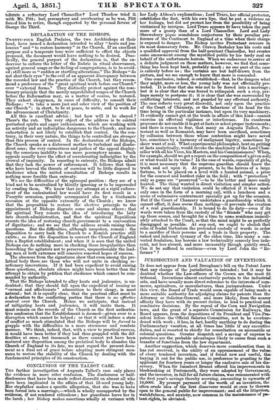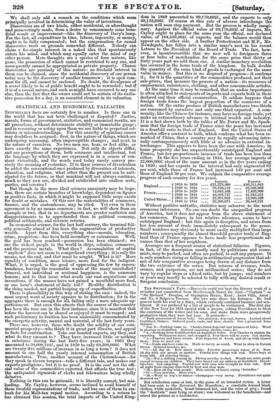J1TRLSDICTION AND VALUATION OF INVENTIONS.
IT does not appear from Lord Brougham's bill on the Patent Laws that any change of the jurisdiction is intended ; but it may be doubted whether the Law-officers of the Crown are the most fit tribunal. Inventions almost exclusively pertain to the industrial arts, and have usually more direct reference to the interests of com- merce, agriculture, or manufactures, than jurisprudence. Under this view, the Board of Trade would seem- capable of being made a more suitable authority for adjudging claims for patents than the Attorney or Solicitor-General, and more likely, from the nearer affinity they have with its present duties, to lead to practical and.. conclusive decisions. By the repeal of the Corn and Navigation. laws, and the grant of a separate Commission for Railways, the Board appears, from the depositions of its President and Vice-Pre, sident before the Official Salaries Committee, not to be overbur- dened with work ; it has, in fact, hardly anything to do during the. Parliamentary vacation, at all times has little if any executive duties, and is resorted to chiefly for consultation on mercantile or colonial questions. Greater despatch and a saving of expense to. patentees- are the probable advantages likely to ensue from such a, transfer of functions from the law department. Another suggestion, which deserves more consideration than it.. has yet received, is the utility of an. appraisement of the valuft. of every tendered invention, and if fonncl new and useful,. the buying it out for the public use, in preference to granting to the applicant for fourteen years or longer the exclusive sale of his dis- covery. When Sir Isambert Brunel' offered' his improvements in. blockmaking- at Portsmouth, they were adopted by Government, and the inventor, in full for all future claims, was remunerated with the first year's savings thereby accruing, amounting to upwards of. L6;()001. By prompt payment of the worth of an invention, the often crude idea of the first discoverer would at. once be thrown.' open to the general. public for improvement; and all the litigation,.. watchfulness, and anxiety, now ammonia the maintenance of pa- tent rights, be obviated.
We shall only add a remark on the conditions which seem principally involved in determining the value of inventions. Discoveries are of two kinds, either accidental, or aforethought and perseveringly made, from a desire to consummate some bene- ficial result or improvement—like the discovery of Davy's lamp. For the last, all expenditure in time, labour, ingenuity, or money, ought to be fully compensated ; but the compensation for casual discoveries rests on grounds somewhat different. Nobody can claim a fee-simple interest in a naked idea that spontaneously enters his mind, and which may equally enter the mind of any other person. Mere thoughts are a species of ferre :naturre, like game, the possession of which cannot be restricted to any one, and consequently cannot be appropriated as private property.. Chance discoveries are precisely of this nature : no freehold interest in them can be claimed, since the accidental discovery of one person today may be the discovery of another tomorrow ; it is open com- mon for all, and cannot be enclosed. No doubt, the divulgence of a secret likely to be of public benefit ought to be rewarded ; but if it is of a casual nature, and such as might have occurred to any one else, then the fact that the owner could not be certain of its exclu- sive possession for a day, is an essential element in its valuation.































 Previous page
Previous page